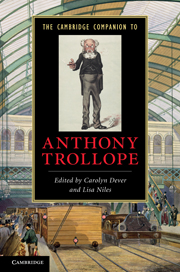Book contents
- Frontmatter
- Introduction
- 1 Trollope’s Literary Life and Times
- 2 Trollope As Autobiographer And Biographer
- 3 Trollope’s Barsetshire Series
- 4 The Palliser Novels
- 5 Trollope Redux: The Later Novels
- 6 Trollope’s Short Fiction
- 7 Trollope And The Sensation Novel
- 8 Queer Trollope
- 9 The hobbledehoy in Trollope
- 10 The construction of masculinities
- 11 Vulgarity and money
- 12 Trollope and the law
- 13 Trollope and travel
- 14 Trollope and the Antipodes
- 15 Trollope and Ireland
- 16 Trollope and America
- Further reading
- Index
- Cambridge Companions to . . .
4 - The Palliser Novels
Published online by Cambridge University Press: 28 March 2011
- Frontmatter
- Introduction
- 1 Trollope’s Literary Life and Times
- 2 Trollope As Autobiographer And Biographer
- 3 Trollope’s Barsetshire Series
- 4 The Palliser Novels
- 5 Trollope Redux: The Later Novels
- 6 Trollope’s Short Fiction
- 7 Trollope And The Sensation Novel
- 8 Queer Trollope
- 9 The hobbledehoy in Trollope
- 10 The construction of masculinities
- 11 Vulgarity and money
- 12 Trollope and the law
- 13 Trollope and travel
- 14 Trollope and the Antipodes
- 15 Trollope and Ireland
- 16 Trollope and America
- Further reading
- Index
- Cambridge Companions to . . .
Summary
For Anthony Trollope, the political novel was both a subject of anxiety and an object of desire. A civil servant disappointed in his effort to become an elected legislator, Trollope aspired to write political fiction, yet he feared that his reading public would not like it. “I commenced a series of semi-political tales,” he recounts in An Autobiography (1883); “As I was debarred from expressing my opinions in the House of Commons, I took this method of declaring myself … In writing [these books]… I was conscious that I could not make a tale pleasing chiefly, or perhaps in any part, by politics. If I write politics for my own sake, I must put in love and intrigue, social incidents, with perhaps a dash of sport, for the sake of my readers. In this way I think that I made my political hero interesting” (A ch. 17). To be palatable, it seems, political medicine must be sweetened with romance, society, and sports.
What exactly did Trollope – and do we – mean by “political novel”? If it is a fictional account of professional politicians’ public policy decisions and back-room machinations, the works in the Palliser series qualify. But as Trollope concedes, such a definition does not promise much to interest a broad readership. Politics by a more capacious definition, however, meaning “actions concerned with the acquisition or exercise of power, status, or authority” (OED s.v. 4.a.) can cover a wide range of plots and character dramas, and in this sense it resonates deeply with the Palliser novels. For while these works are in part concerned with the professional lives of fictive politicians, government policy and party loyalty, election campaigns and jockeying for ministries, they are also at least as much about romance, marriage, and conflicts between parents and children – in short, about the traditional materials of the novel genre: private and domestic life. The challenge for Trollope was to get both kinds of stories into the same novels; the challenge for his readers is to understand the relationship between them.
- Type
- Chapter
- Information
- The Cambridge Companion to Anthony Trollope , pp. 44 - 57Publisher: Cambridge University PressPrint publication year: 2010
- 3
- Cited by

